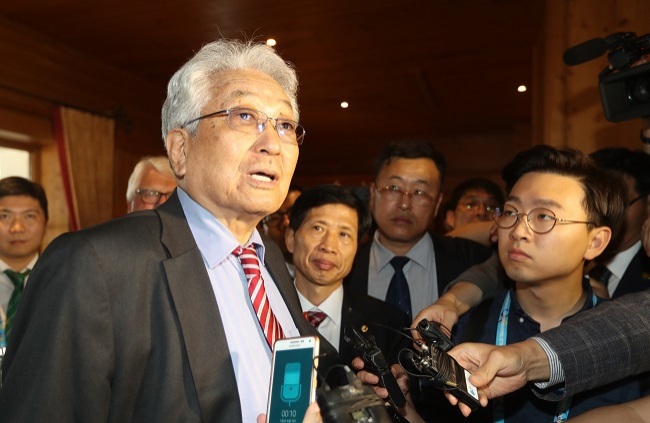N. Korean IOC member says Koreas face time crunch to field joint team at '18 Olympics
By Alex ParkPublished : June 30, 2017 - 11:22
MUJU -- The Koreas face a time crunch and political uncertainty before they could start discussions on fielding a joint team at next year's Winter Olympics south of the border, the North's lone International Olympic Committee member said Thursday.
Chang Ung has been in South Korea since last Friday for the World Taekwondo Federation World Taekwondo Championships in Muju, 240 kilometers south of Seoul. He traveled with a delegation from the North Korea-led International Taekwondo Federation.
Chang arrived in South Korea just days after South Korea's new sports minister, Do Jong-hwan, proposed forming a joint women's hockey team and holding skiing events at North Korea's Masikyrong resort during the 2018 PyeongChang Winter Olympics. Then in the opening ceremony of the WTF competition, South Korean President Moon Jae-in also extended an invitation to North Korea to take part in the PyeongChang Games.
IOC President Thomas Bach, who also arrived here Thursday, expressed his support for Moon's initiative, saying the Olympic Games are as much about peace as about competition.

The two Koreas remain technically at war because the Korean War ended in 1953 with an armistice, not a peace treaty.
Chang, on the other hand, reiterated his skepticism that a joint team will actually materialize.
Moon, who took office in May as the first liberal South Korean president in nearly a decade, has offered to take a dual track approach on North Korea, seeking the North's denuclearization while pushing for inter-Korean dialogue amid North Korea's evolving nuclear and missile threats.
When told the new South Korean government has seemed more determined than previous administrations to engage North Korea, Chang responded, "I think being willing to do something and actually doing it are two different things."
Chang referred to earlier instances of inter-Korean sports exchanges to further illustrate the difficulties of the current situation, especially since the PyeongChang Games will start in just about seven months.
In 1991, the Koreas competed as one at the World Table Tennis Championships. Chang said it took two years of negotiations to make it happen.
The countries also marched in together at the opening ceremony for the 2000 Sydney Olympics, held just months after the first inter-Korean summit between two former leaders, Kim Dae-jung for South Korea and Kim Jong-il for North Korea.
Even then, Chang said, the two Koreas' talks went down to the wire, as he and his South Korean counterpart, former IOC vice president Kim Un-yong, held seven rounds of talks after they arrived in Sydney.
"Back then, the political situation was quite good," Chang said. "This is the grave reality; it's never easy. You should all study history."
After landing in South Korea, Bach said the IOC is supporting North Korean athletes in order for them to qualify for PyeongChang, indicating that the IOC may issue "wild cards" to North Korean athletes if no one from the country qualifies.
Chang had his doubts about that prospect, too.
"It's only hypothetical, and many different departments at the IOC are involved," he said. "We should stop this discussion. We should only talk about what's practically possible. I think it's going to be very difficult." (Yonhap)






![[From the Scene] Monks, Buddhists hail return of remains of Buddhas](http://res.heraldm.com/phpwas/restmb_idxmake.php?idx=644&simg=/content/image/2024/04/19/20240419050617_0.jpg&u=20240419175937)





![[Graphic News] French bulldog most popular breed in US, Maltese most popular in Korea](http://res.heraldm.com/phpwas/restmb_idxmake.php?idx=644&simg=/content/image/2024/04/18/20240418050864_0.gif&u=)


![[From the Scene] Monks, Buddhists hail return of remains of Buddhas](http://res.heraldm.com/phpwas/restmb_idxmake.php?idx=652&simg=/content/image/2024/04/19/20240419050617_0.jpg&u=20240419175937)

![[KH Explains] Hyundai's full hybrid edge to pay off amid slow transition to pure EVs](http://res.heraldm.com/phpwas/restmb_idxmake.php?idx=652&simg=/content/image/2024/04/18/20240418050645_0.jpg&u=20240419100350)

![[Today’s K-pop] Illit drops debut single remix](http://res.heraldm.com/phpwas/restmb_idxmake.php?idx=642&simg=/content/image/2024/04/19/20240419050612_0.jpg&u=)